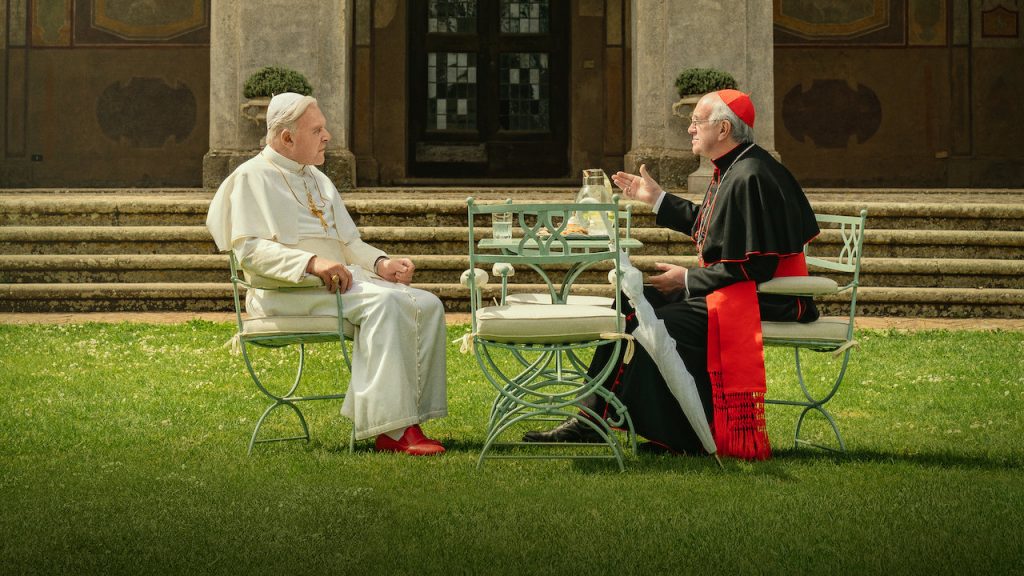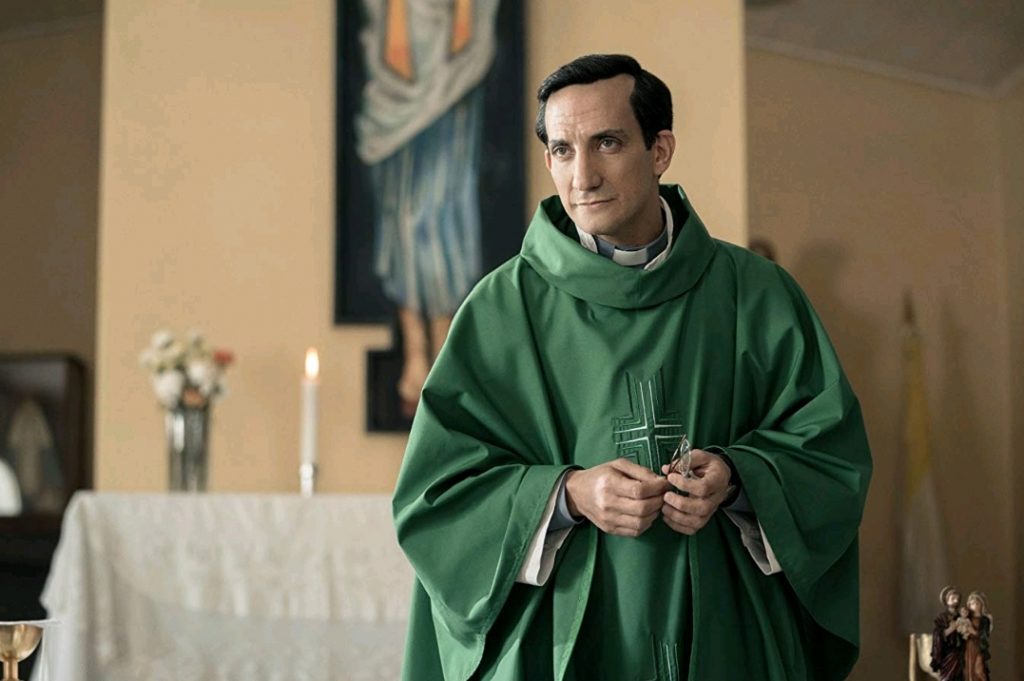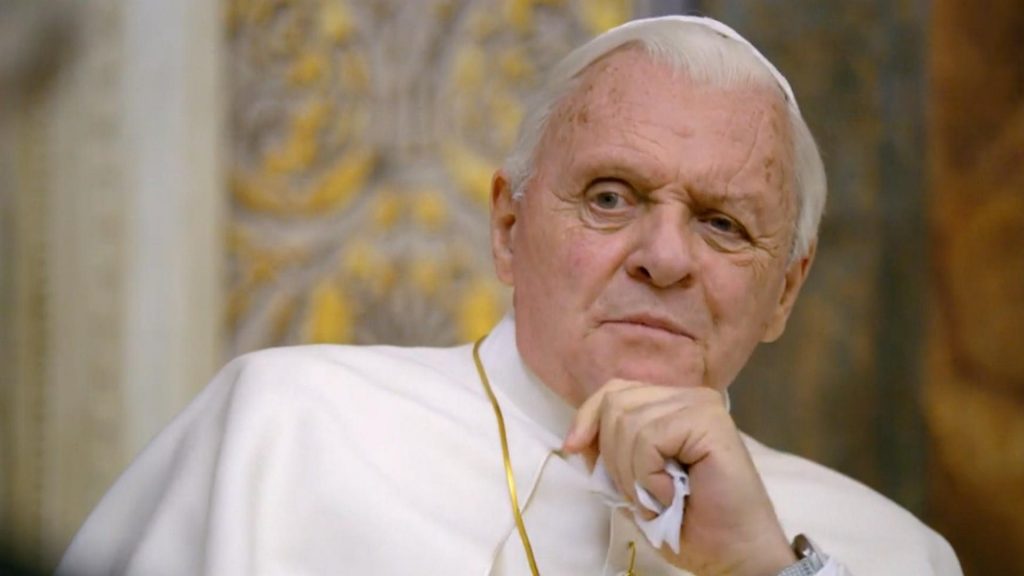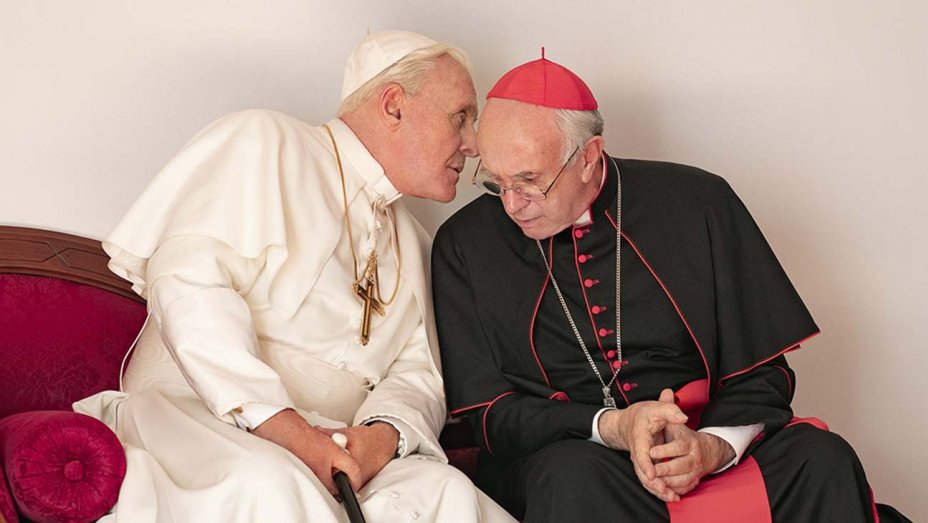‘The Two Popes,’ directed by Fernando Meirelles, is an exceptional film about religion because it stays with you and forms a connection, irrespective of your religious inclinations and background. At its core, the film is a touching story about guilt and forgiveness, about being human and having faith. It is a rare and difficult feat to create a film on religious figures and maintain a sense of honesty, but Meirelles manages to achieve it with such grace and a heartwarming sense of humor.
The film is written by Anthony McCarten of ‘Bohemian Rhapsody‘ and ‘The Darkest Hour‘ fame, and is based on his own play titled, ‘The Pope’. McCarten began working on its idea after he attended a mass by Pope Francis that made him wonder how it all really happened. ‘The Two Popes’ centers around a series of imaginary conversations between Pope Benedict XVI and Cardinal Bergoglio (before he became Pope Francis), set in 2012, a few months before Benedict resigned and Francis became his successor.
The key idea behind the film was to humanize the papacy and explore the two religious leaders as normal human beings who live their lives with doubt, guilt, and regrets like all of us do. To have them share pizza and watch football, bond, and disagree as people usually do. In an interview, Meirelles stated: “I wanted to make it a film not about a pope and a cardinal, but about two men who talk and disagree.”
In its essence ‘The Two Popes’ is about two men, who share their faith, coming together despite their personal and ideological differences, for the greater good of the people they serve. But for that they need to confront their pasts, and converse with each other even when they don’t meet eye to eye. This is precisely what happens in the film. But how much of it is true?
The Conversations Between the Two Popes

For starters, there is no record or proof of the popes ever having any of the conversations that are portrayed in the film with each other. You see, they aren’t exactly friends. Those conversations were entirely fictionalized. But is based on a string of facts and actual views of the two popes. In an interview with USA Today, Meirelles stated: “All the dialogue, this is all taken from speeches or interviews or their writings. So what they say in the film is what they did say at some point in their lives.” It is well known that Pope Benedict XVI was a conservative who went back to the earlier practices of the Church and reaffirmed traditional Catholic identity. He was praised by the conservatives but also accused by the liberals of not working on making much-needed reforms in the system.
In real life, Benedict was a quiet, intellectual figure who formerly had a long academic career as a theology professor. As shown in ‘The Two Popes’, Benedict, played by Anthony Hopkins, did live in his summer house in Casa Gandolfo. He also re-introduced several papal garments which had fallen to disuse like the red papal shoes which Hopkin’s Benedict wears, which also starts one of the earlier debates between him and Francis.
Pope Francis, on the other hand, is known to have a relatively more liberal and minimalist approach, which the film has also gotten right with Jonathan Pryce’s Francis. He is known to have had open discussions on relevant issues like climate change, the economy, war, and human rights-related subjects, including homosexuality and the role of women in the church. He doesn’t step away completely from traditional views of the Catholic Church and is against gay marriage and abortion, among several other things. But he has still made a step towards making the church inclusive of people from all communities, as he preaches mercy towards all beings irrespective of who they are, how they are made, and how they sin.
From Fanta to Tango: How Much of It is Real?
The movie has the two popes interact properly for the first time at Benedict’s summer residence, where Francis flies in because he wants to resign and has his own doubts about where the Church is headed. This premise is entirely fictional, as there is no proof that Francis ever thought of resigning and that Benedict summoned him because he wanted to discuss his own resignation with him.
Benedict did have to fly to the Vatican from his summer residence because of the Vatileak scandal, as shown in the film, but he went back alone. It is also true that Benedict and Francis met around three times before Benedict resigned, so they definitely did have conversations, but of course, there is no way to know what they spoke about.
Also, though the two popes never watched soccer or had pizza together, nor did they ever tango together, as shown in ‘The Two Popes,’ there was some truth to those scenes as well. Benedict is indeed really fond of drinking Fanta, and he loves playing the piano, as the film portrays. In fact, pope emeritus Benedict spends a lot of his time playing Mozart and Beethoven on his piano, as the two are his favourite composers.
The piano scene between the two in the film becomes significant, as it symbolizes harmony between them despite their differences. Similarly, Pope Francis, being from Argentina, has a deep love for dancing tango and watching football from a time when he was simply Jorge Bergoglio. The scenes were created to offer a contrast to the grandiosity of the Church and show a much more humane side to the two characters.
Real-Life Footage
Despite the film’s fictional premise, ‘The Two Popes’ is actually rooted in reality in many ways, even if it’s not historically accurate. The movie uses real-life news footage for its various scenes in the narrative.
This is first seen towards the beginning of the film when Pope John Paul II passes away. The funeral shown in the film is actually from real videos that were incorporated in the film. Similarly, Meirelles made use footage taken from real life in the election of where Ratzinger is elected pope and becomes Pope Benedict XVI.
The people applauding, and even the people criticizing him were all taken from real-life, including the celebrations when he first becomes Pope. Real-life footage was also used in the ending of the film when Bergoglio becomes Pope Francis, and travels widely to meet his people. The film also shows real-life interactions between Pope Benedict and Pope Francis. All of this was done in an attempt to make the narrative feel balanced and authentic, which I think it achieved successfully.
Pope Francis and the ‘Dirty War’

One of the most important parts of ‘The Two Popes’ is Bergoglio’s flashbacks and his confession to Benedict. These are, in fact, true incidents. Not the confession of course. But Bergoglio was in fact involved in the military dictatorship in Argentina which was infamously called the “Dirty War”. Bergoglio was accused of his silence during this period and was said to have been close to the military. Among the best-known accusers were two of his former teachers, Yorio and Jalics, who were working in the slums and helping leftists. This is shown in the film accurately. Bergoglio was worried about the welfare of his own priests and ordered them to stop their work. When they declined, he let them go from the Jesuit order. After which, they were kidnapped and tortured by junta thugs. Over the years, Bergoglio actually acknowledged his own mistakes.
He stated that he made “hundreds of errors” but believes he made these mistakes during the turbulent period because he had been “put into the job too early”. But it also believed that he was not a part of any wrongdoing, but he regretted not doing more for the people than he did. According to Alicia Oliveira, an old friend of Francis, he was very critical of the dictatorship and did not have any links to the military. He was, in fact, concerned for the priests who did social work in the slums and even went to Massera (the then-head of the navy) to ask for their release.
Pope Benedict XVI’s Resignation

This finally brings to Pope Benedict’s resignation, which was in fact, portrayed quite accurately, but the film did take several artistic liberties. Benedict shocked the world in February 2013 when he declared his decision to resign as that has never been a part of the tradition. Popes were considered martyrs who lived as pontiffs until they die. The last Pope who resigned did so over 600 years back.
Benedict cited his advanced age and deteriorating health as the primary reason for his resignation. He believed that he was physically and mentally not in his best state to lead the church, explaining that his condition made him “recognize my incapacity to adequately fulfill the ministry entrusted to me.” But of course, there were also other reasons, as mentioned in the film, like the ongoing sexual abuse scandal, the Vatileak scandal, as well as issues with the Vatican bank.
“The Two Popes” is a carefully and masterfully crafted visual narrative that resulted from McCarten’s explorations and extensive research about the lives and views of the two popes. However, it employs fiction to fill in the gaps, make the film feel more honest, and create a much-needed dialogue between the two sides of the Catholic Church. It is a film for everyone to watch, irrespective of how they feel towards God, because of the honesty with which it’s made, and I urge you to watch it if you haven’t already.
Read More: Where is Pope Benedict XVI Now?


You must be logged in to post a comment.